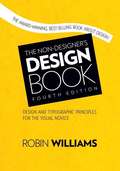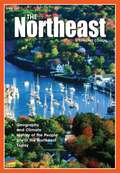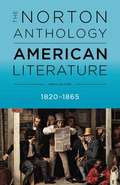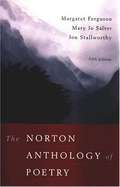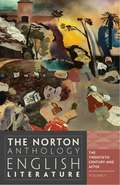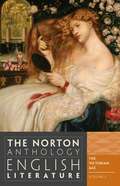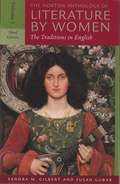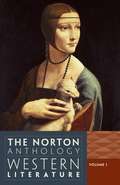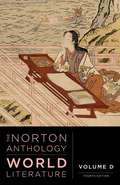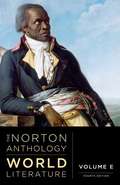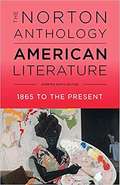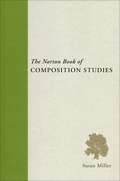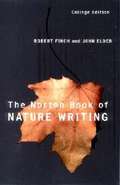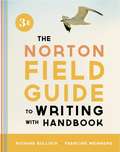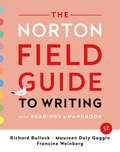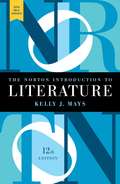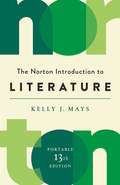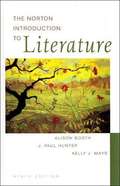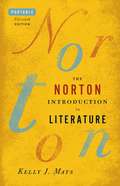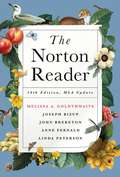- Table View
- List View
The Noisy Neighbors (Fountas & Pinnell Classroom, Guided Reading)
by Mike Spoor Riley ObachNIMAC-sourced textbook. RAT-A-TAT-TAT! JAY-JAY! JAY-JAY! Bertha has new neighbors, and are they noisy! So Bertha finds a new home, one that is peaceful and quiet. But is it a little too quiet?
The Non-Designer's Design Book: Design And Typographic Priciples For The Visual Novice (Fourth Edition)
by Robin WilliamsFor nearly 20 years, designers and non-designers alike have been introduced to the fundamental principles of great design by author Robin Williams. Through her straightforward and light-hearted style, Robin has taught hundreds of thousands of people how to make their designs look professional using four surprisingly simple principles. Now in its fourth edition, The Non-Designer’s Design Book offers even more practical design advice, including a new chapter on the fundamentals of typography, more quizzes and exercises to train your Designer Eye, updated projects for you to try, and new visual and typographic examples to inspire your creativity.
The Northeast
by Stephanie CohenFind out about the people, geography, and economy of the Northeast region of the United States.
The Norton Anthology Of American Literature: 1820-1865
by Robert LevineA responsive, refreshed, and media-rich revision of the market-leading anthology of American literature. <p><p> The most-trusted anthology for complete works, balanced selections, and helpful editorial apparatus, The Norton Anthology of American Literature features a cover-to-cover revision. The Ninth Edition introduces new General Editor Robert Levine and three new-generation editors who have reenergized the volume across the centuries. Fresh scholarship, new authors―with an emphasis on contemporary writers―new topical clusters, and a new ebook make the Norton Anthology an even better teaching tool and an unmatched value for students.
The Norton Anthology Of Poetry (Fifth Edition)
by Jon Stallworthy Mary Jo Salter Margaret FergusonThe Fifth Edition retains the flexibility and breadth of selection that has defined this classic anthology, while improved and expanded editorial apparatus make it an even more useful teaching tool.
The Norton Anthology of English Literature: The Twentieth Century and After
by Stephen Greenblatt Jahan Ramazani M. H. Abrams Jon Stallworthy Greenblatt James Simpson Catherine Robson George M. Logan James Noggle Jack Stillinger Carol T. Christ Alfred David Barbara K. Lewalski Lawrence Lipking Deidre Shauna Lynch Katharine Eisaman MausThe Ninth Edition offers more complete works and more teachable groupings than ever before, the apparatus you trust, and a new, free Supplemental Ebook with more than 1,000 additional texts. Read by more than 8 million students, The Norton Anthology of English Literature sets the standard and remains an unmatched value.
The Norton Anthology of English Literature: The Victorian Age
by Stephen Greenblatt Jahan Ramazani M. H. Abrams Jon Stallworthy James Simpson Catherine Robson James Noggle Jack Stillinger Alfred David Lawrence Lipking Carol Christ Deidre Lynch Katharine Maus George Logan Barbara LewalskiThe Ninth Edition offers more complete works and more teachable groupings than ever before, the apparatus you trust, and a new, free Supplemental Ebook with more than 1,000 additional texts. Read by more than 8 million students, The Norton Anthology of English Literature sets the standard and remains an unmatched value.
The Norton Anthology of Literature by Women: The Traditions in English, Volume 1
by Susan Gubar Sandra Gilbert<p>Long the standard teaching anthology, the landmark Norton Anthology of Literature by Women has introduced generations of readers to the rich variety of women’s writing in English. <p>Now, the much-anticipated Third Edition responds to the wealth of writing by women across the globe with the inclusion of 61 new authors (219 in all) whose diverse works span six centuries. A more flexible two-volume format and a versatile new companion reader make the Third Edition an even better teaching tool.</p>
The Norton Anthology of Western Literature
by Pericles Lewis Suzanne Conklin Akbari Barbara Fuchs Martin Puchner Wiebke Denecke Caroline Levine Emily WilsonThis edition of The Norton Anthology of Western Literature provides a generous collection of the Western literary tradition in a format that will suit the needs of instructors and students encountering that tradition for the first time. This Ninth Edition represents a thoroughgoing, top-to-bottom revision of the anthology that altered nearly every section in important ways. The book provide instructors and students with several supplements to make the study and teaching of Western literature an even more interesting and rewarding experience.
The Norton Anthology of World Literature: Volume D
by Pericles Lewis Suzanne Conklin Akbari Barbara Fuchs Martin Puchner Wiebke Denecke Vinay Dharwadker Caroline Levine Emily WilsonAn unmatched value and an incomparable resourceThe Fourth Edition of the most trusted and widely used anthology of world literature retains and expands the most popular works from the last edition, while refreshing the anthology with NEW selections and NEW translations of major works. As always, the Norton provides hundreds of literary selections, helpful apparatus, beautiful illustrations, and a robust suite of digital resources, all at an affordable price.
The Norton Anthology of World Literature: Volume E
by Pericles Lewis Suzanne Conklin Akbari Barbara Fuchs Martin Puchner Wiebke Denecke Vinay Dharwadker Caroline Levine Emily WilsonRead by millions of students since its first publication, The Norton Anthology of World Literature remains the most- trusted anthology of world literature available. Guided by the advice of more than 500 teachers of world literature and a panel of regional specialists, the editors of the Third Edition--a completely new team of scholar- teachers--have made this respected text brand-new in all the best ways. Dozens of new selections and translations, all- new introductions and headnotes, hundreds of new illustrations, redesigned maps and timelines, and a wealth of media resources all add up to the most exciting, accessible, and teachable version of this anthology ever published.
The Norton Anthology: American Literature - 1865 to the Present
by Robert S. LevineThe most trusted anthology for complete works, balanced selections, and helpful editorial apparatus, The Norton Anthology of American Literature, Shorter Ninth Edition, features a cover-to-cover revision. General Editor Robert Levine and the four period editors―three of whom are new to the team―have reenergized the anthology. Fresh scholarship, NEW authors and topical clusters, a NEW ebook, and an enriched instructor site make the Norton Anthology an even better teaching tool for instructors and an unmatched value for students.
The Norton Book of Composition Studies
by Susan MillerThe Norton Book of Composition Studies introduces new students to the historical development and most consequential themes and emphases of the field’s scholarship. It serves both as textbook as well as professional reference.
The Norton Book of Nature Writing, College Edition
by Robert Finch John ElderThe Norton Book of Nature Writing, College Edition offers, for the first time, a paperback edition of this ground-breaking anthology. In addition to its significantly expanded table of contents, the new version has been augmented by a Field Guide for teachers and students, written by Lilace Mellin Guignard, a writer and teacher at the Center for Environmental Literature of the University of Nevada at Reno. The Field Guide includes a thematic table of contents with useful groupings of the readings and a set of three study questions for each selection. These questions call attention to literary techniques and themes, suggest connections among various authors in the collection, and invite response to the personal or political challenges posed by particular selections. For students, these questions may offer a further context for their initial encounters with these readings and help to identify rich areas to explore further in their own writing. For teachers, they may serve as prompts for student journals or as topics for discussion in class.
The Norton Field Guide to Writing, with Handbook (Third Edition)
by Richard Bullock Francine WeinbergFlexible, easy to use, just enough detail-and now the number-one best seller. With just enough detail - and color-coded links that send students to more detail if they need it - this is the rhetoric that tells students what they need to know and resists the temptation to tell them everything there is to know. Designed for easy reference - with menus, directories, and a combined glossary/index. The Third Edition has new chapters on academic writing, choosing genres, writing online, and choosing media, as well as new attention to multimodal writing. The Norton Field Guide to Writing is available with a handbook, an anthology, or both - and all versions are now available as low-cost ebooks.
The Norton Field Guide to Writing: With Readings and Handbook
by Richard Bullock Francine Weinberg Maureen GogginThe Norton Field Guide lets you teach the way you want to teach. Short chapters with just enough detail can be assigned in any order. Color-coded links send students to more detail if they need it. Menus, directories, and a glossary/index all make the book easy to navigate. This flexibility makes it work for first-year writing, stretch, ALP, co-req, dual-enrollment, and integrated reading-writing courses.
The Norton Introduction To Literature With 2016 MLA Update
by Kelly MaysThe Norton Introduction to Literature presents an engaging, balanced selection of literature to suit any course. Offering a thorough treatment of historical and critical context, the most comprehensive media package available, and a rich suite of tools to encourage close reading and thoughtful writing, the Twelfth Edition is unparalleled in its guidance of understanding, analyzing, and writing about literature.
The Norton Introduction to Literature
by Kelly J. MaysThis diverse and affordable collection offers the trusted writing guidance students need, along with the exciting mix of stories, poems, and plays instructors want. The Thirteenth Edition adds more contemporary works to engage today's students and new pedagogical tools to help foster close reading and careful writing, making this book the best choice for helping students appreciate, analyze, and write.
The Norton Introduction to Literature (Ninth Edition)
by Alison Booth Kelly J. Mays J. Paul HunterThe Norton Introduction to Literature is a collection of the very best classic and contemporary stories, poems, and plays, in a flexible and inviting format that accommodates many different teaching styles, reading tastes, and pedagogical needs. The Ninth Edition offers two new contextual chapters, a completely rewritten section on writing about literature, refreshed pedagogy throughout the book, many new student-writing samples, and 60 new literary selections.
The Norton Introduction to Literature (Portable Eleventh Edition)
by Kelly J. MaysThe Norton Introduction to Literature offers teachers the finest, most diverse selections and the most carefully edited apparatus for analyzing texts and writing thoughtfully.
The Norton Mix History: U.S. History through 1877 A Document Collection
by Ansley QuirosThe Norton Mix World History - The World 1500-1800 HTST 204 University of Calgary by Karen Dunn-Haley, Jared Poley, Erin Blakemore, Steve Davis, University of Calgary.
The Norton Reader (Fourteenth Edition, MLA Update)
by Joseph Bizup Melissa Goldthwaite John Brereton Anne Fernald Linda PetersonThe Norton Reader began as an attempt to introduce students to the essay as a genre, and to create an anthology of excellent nonfiction writing. This new edition continues that tradition, offering a wide selection of essays on a broad range of subjects, and including examples of the kinds of writing students are most assigned, from profiles and arguments to narratives and analyses.

